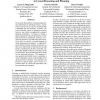Free Online Productivity Tools
i2Speak
i2Symbol
i2OCR
iTex2Img
iWeb2Print
iWeb2Shot
i2Type
iPdf2Split
iPdf2Merge
i2Bopomofo
i2Arabic
i2Style
i2Image
i2PDF
iLatex2Rtf
Sci2ools
LOGCOM
2007
2007
A General Framework for Expressing Preferences in Causal Reasoning and Planning
We consider the problem of incorporating arbitrary preferences in planning systems. A preference may be seen as a goal or constraint that is desirable, but not necessary, to satisfy. We work within the context of transition systems; however, our results are applicable to general planning formalisms. To begin, we define a query language for specifying arbitrary conditions that may be satisfied by a history, or interleaved sequence of world states and actions. Given this, we specify a second language in which preferences are defined. A single preference defines a binary relation on histories, so that in an ordered pair of histories the second history is preferred to the first. From this, one can define global preference orderings on the set of histories, the maximal elements of which are the preferred histories. The approach is very general and flexible; thus it constitutes a “base” language in terms of which higher-level operators may be defined. The approach can be used to...
Related Content
| Added | 16 Dec 2010 |
| Updated | 16 Dec 2010 |
| Type | Journal |
| Year | 2007 |
| Where | LOGCOM |
| Authors | James P. Delgrande, Torsten Schaub, Hans Tompits |
Comments (0)

